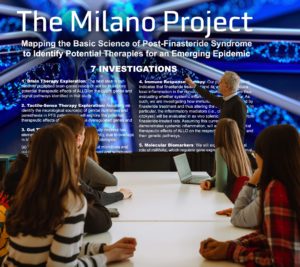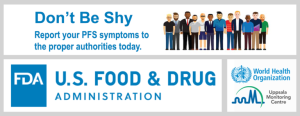Initial therapeutic target is allopregnanolone
April 11, 2024
Dear Friends:
Roberto Cosimo Melcangi, PhD, is taking a page out of Robert Oppenheimer’s playbook.
 The Head of the Neuroendocrinology Unit in the Department of Pharmacological and Biomolecular Sciences at the University of Milano (UniMi) this week launched an initiative to supercharge post-finasteride syndrome (PFS) research and, in doing so, identify potential therapies for the condition.
The Head of the Neuroendocrinology Unit in the Department of Pharmacological and Biomolecular Sciences at the University of Milano (UniMi) this week launched an initiative to supercharge post-finasteride syndrome (PFS) research and, in doing so, identify potential therapies for the condition.
Inspired by Oppenheimer’s Manhattan Project—designed to end World War II by developing the first atomic bomb—the Milano Project has a target completion date of Dec. 31, 2026, and is budgeted at $300,000.
Thanks to pre-launch contributions of $30,000, however, the initiative is already 10% funded, which means we have more than two years to raise the remaining $270,000.
Mission: now possible
The Milano Project is designed to build upon Team Melcangi’s institutional knowledge of PFS, amassed through 14 published studies on the condition during 13 years of uninterrupted research. The initiative carries six key objectives:
 • Accelerate two PFS investigations already under way.
• Accelerate two PFS investigations already under way.
• Conduct 5 new PFS investigations, including 1 to establish biomarkers for the condition.
• Complete all 7 investigations by the end of 2026, and publish the last of them in 2027.
• Compile molecular, genetic, and epidemiological data demonstrating that (a) PFS exits, (b) the condition manifests itself in myriad persistent side effects, (c) there exists a critical mass of finasteride patients afflicted by the condition, and (d) based on trials in an animal model, allopregnanolone is a potential therapeutic agent for one or more PFS symptoms. Use that data to seek approval from the Italian Medicines Agency (AIFI) to conduct clinical trials on human patients in a clinical setting.
• Share data with qualified researchers at institutions outside of UniMi, exploring with them the possibility of working on complementary projects so that Team Melcangi’s recommended “next step” investigations may be conducted concurrent with the Milano Project, or soon after it wraps. One such study is already being formulated in the UK.
• Establish infrastructures within the research and regulatory-approval processes, so that if/when additional potential PFS therapies are identified, they can be tested on human patients in the fastest, most efficient way possible.
“When we began investigating PFS more than a decade ago, we were pretty much groping in the dark as to the nature of this phenomenon from a molecular point of view,” says Prof. Melcangi. “But the past two years have brought several breakthroughs that, when considered with the entire body of PFS research published to date, tell us it’s critical to complete the Milano Project as soon as possible—if we ever hope to identify effective therapies.”
A PowerPoint presentation on the Milano Project can be downloaded here.
Time to pass the hat
Beginning immediately, the PFS Foundation is seeking donations toward the Milano Project’s remaining budget of $270,000, not only from those directly impacted by PFS, but from their family members, friends, and health providers.
Please note that the last page of the PowerPoint presentation contains a Donate Now button that links to our Donate Now page.
Additionally, beginning in July, we will provide quarterly updates on the project as it progresses toward completion.
 Finasteride was originally developed by Merck & Co., Inc., and first approved by the US Food and Drug Administration in 1993 as Proscar (5 mg, for enlarged prostate), and again in 1997, as Propecia (1 mg, for hair loss).
Finasteride was originally developed by Merck & Co., Inc., and first approved by the US Food and Drug Administration in 1993 as Proscar (5 mg, for enlarged prostate), and again in 1997, as Propecia (1 mg, for hair loss).
In June 2021, Merck spun off its Organon subsidiary as an independent public company (NYSE: OGN). Founded in the Netherlands in 1923, Organon bills itself as a “global health care company dedicated to making a world of difference for women, their families and the communities they care for.”
 Among the Merck products Organon acquired in the deal were Proscar and Propecia. To report adverse events for either finasteride product, call the Organon Service Center at (844)674-3200, or email Service_Center@Organon.com.
Among the Merck products Organon acquired in the deal were Proscar and Propecia. To report adverse events for either finasteride product, call the Organon Service Center at (844)674-3200, or email Service_Center@Organon.com.
Anyone living in the US who suffers from PFS should also report his or her symptoms to the US FDA. Anyone living outside the US who suffers from PFS should report his or her symptoms to the US FDA as well as to his or her local DRA, as directed on our Report Your Side Effects page.
If you or a loved one are suffering from PFS, and feeling depressed or unstable, please don’t hesitate to contact the PFS Foundation as soon as possible via our Patient Support hotline: social@pfsfoundation.org
Thank you.
